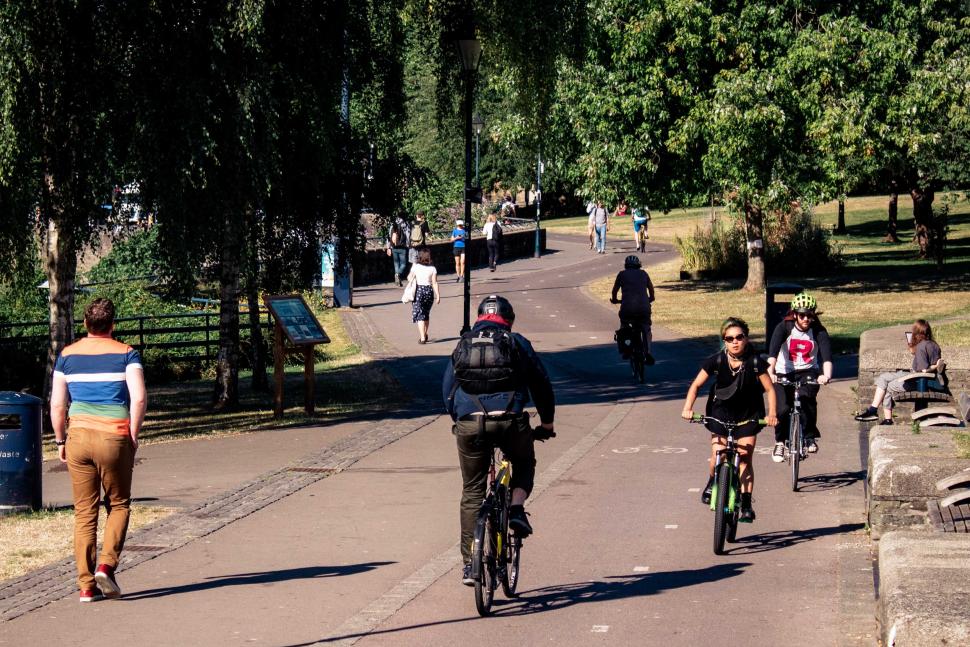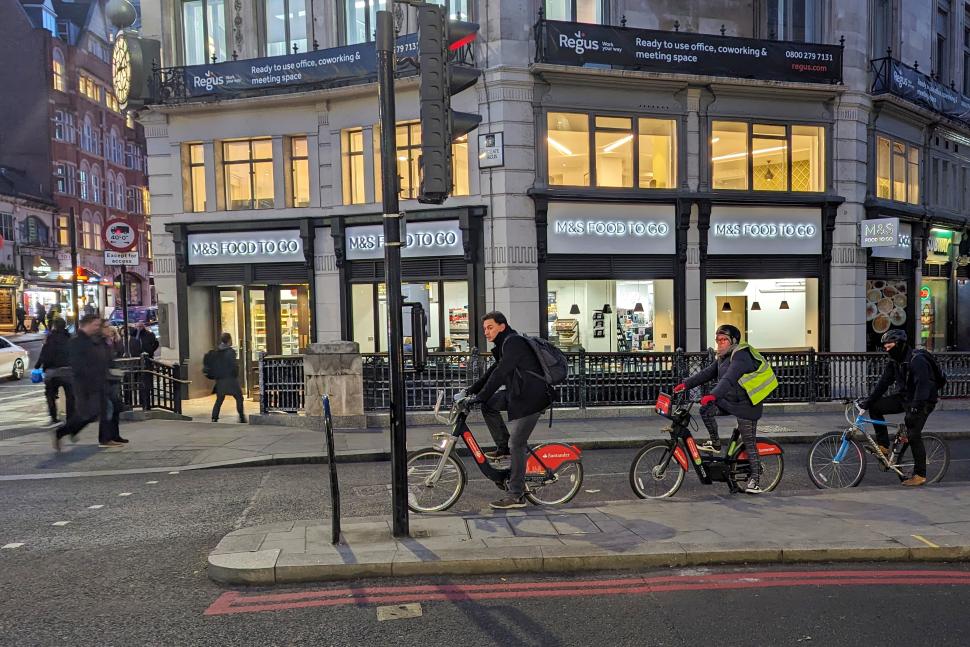- News
- Reviews
- Bikes
- Components
- Bar tape & grips
- Bottom brackets
- Brake & gear cables
- Brake & STI levers
- Brake pads & spares
- Brakes
- Cassettes & freewheels
- Chains
- Chainsets & chainrings
- Derailleurs - front
- Derailleurs - rear
- Forks
- Gear levers & shifters
- Groupsets
- Handlebars & extensions
- Headsets
- Hubs
- Inner tubes
- Pedals
- Quick releases & skewers
- Saddles
- Seatposts
- Stems
- Wheels
- Tyres
- Tubeless valves
- Accessories
- Accessories - misc
- Computer mounts
- Bags
- Bar ends
- Bike bags & cases
- Bottle cages
- Bottles
- Cameras
- Car racks
- Child seats
- Computers
- Glasses
- GPS units
- Helmets
- Lights - front
- Lights - rear
- Lights - sets
- Locks
- Mirrors
- Mudguards
- Racks
- Pumps & CO2 inflators
- Puncture kits
- Reflectives
- Smart watches
- Stands and racks
- Trailers
- Clothing
- Health, fitness and nutrition
- Tools and workshop
- Miscellaneous
- Buyers Guides
- Features
- Forum
- Recommends
- Podcast
 Cyclists and pedestrians in Castle Park, Bristol (image: Adwitiya Pal)
Cyclists and pedestrians in Castle Park, Bristol (image: Adwitiya Pal)Cycling one short journey a day enough to lower blood pressure, new research finds
New research has further highlighted the health gains that can be achieved simply by switching your mode of transport from something sedentary to cycling, with blood pressure shown to reduce with as little as a few minutes of exercise.
The study was carried out by ProPass, an international academic collaboration led by University College London and the University of Sydney. It examined the effect of physical activity on blood pressure and found that even very short-duration exercise can have a positive impact.
Even as little as five minutes of extra exercise a day was sufficient to reduce blood pressure, while replacing sedentary behaviours with 20-27 minutes of exercise per day (such as cycling, running, uphill walking and stair-climbing) was sufficient for a clinically meaningful reduction in blood pressure.
Data for 14,761 people who wore activity trackers was examined, the researchers finding that people spent an average of 7.13 hours sleeping, 10.7 hours undertaking sedentary behaviour, 3.2 hours standing, 1.6 hours slow walking, 1.1 hours fast walking, and 16 minutes on exercise-like activity. The study saw the researchers statistically model what would happen if participants changed some activities for others.
More time spent exercising or sleeping, relative to other behaviours, was associated with lower blood pressure, researchers concluded. As little as five minutes of extra exercise-like activity to raise a person's heart rate could see blood pressure reductions.
For systolic blood pressure (SBP: the higher of the two numbers; pressure against arteries when the heart pumps blood), clinically meaningful improvements were estimated after 20 to 27 minutes of reallocating other behaviours into additional exercise.
For diastolic blood pressure (DBP: the lower number; pressure against arteries while the heart rests between beats), clinically meaningful improvements were estimated after 10 to 15 minutes of reallocation time.
Five extra minutes of exercise could lower SBP by 0.68mm HG (millimetres of mercury) and DBP by 0.54 mm HG. At a population level, a 2mm HG reduction in SBP and 1mm HG reduction in DPB would be equivalent to a 10 per cent reduction in the risk of heart disease.
The study concluded that "although more time spent being sedentary was adversely associated with SBP and DBP, there was minimal impact of standing or walking" and the findings "reiterate the importance of exercise for BP control, suggesting that small additional amounts of exercise are associated with lower BP in a free-living setting".
It is further evidence of the potential health benefits that can be gained from simply cycling one short journey or errand each day. In July, research published in the British Medical Journal concluded that cycling your commute can lower risk of death by 47 per cent (as long as you aren't hit by a driver).
Likewise, another study published this year found that commuting by bike can improve mental health, with those who cycle to work less likely to be prescribed antidepressants.
Commenting on the latest research, Dr Jo Blodgett from the Division of Surgery and Interventional Science at UCL and the Institute of Sport, Exercise and Health said: "Our findings suggest that, for most people, exercise is key to reducing blood pressure, rather than less strenuous forms of movement such as walking.
"The good news is that whatever your physical ability, it doesn't take long to have a positive effect on blood pressure. What's unique about our exercise variable is that it includes all exercise-like activities, from running for a bus or a short cycling errand, many of which can be integrated into daily routines.
"For those who don't do a lot of exercise, walking did still have some positive benefits for blood pressure. But if you want to change your blood pressure, putting more demand on the cardiovascular system through exercise will have the greatest effect."
Dan is the road.cc news editor and joined in 2020 having previously written about nearly every other sport under the sun for the Express, and the weird and wonderful world of non-league football for The Non-League Paper. Dan has been at road.cc for four years and mainly writes news and tech articles as well as the occasional feature. He has hopefully kept you entertained on the live blog too.
Never fast enough to take things on the bike too seriously, when he's not working you'll find him exploring the south of England by two wheels at a leisurely weekend pace, or enjoying his favourite Scottish roads when visiting family. Sometimes he'll even load up the bags and ride up the whole way, he's a bit strange like that.
Latest Comments
- Deac 1 hour 1 min ago
I tried the footrest on the way home, it's a great idea, you can keep on the saddle making it easier to get away from the traffic lights, and being...
- chrisonabike 2 hours 59 min ago
Agreed - if you've had the bike a while you've probably added bits to it / upgraded. In my case that included about 150 quid of cut locks......
- mdavidford 3 hours 31 min ago
"Driver fined £100 after stopping to be sick" https://www.bbc.co.uk/news/articles/ce8g13pp0plo
- ktache 3 hours 55 min ago
Not that they would be as technical, or maybe quite as grippy, but does the skate industry provide any solutions?
- wtjs 4 hours 10 min ago
the Metropolitan Police contacted Vikash to inform him that they have created a report for the incident and that the video has been “passed to the...
- Rendel Harris 4 hours 37 min ago
Sorry to be a killjoy but it doesn't amuse me at all, I hope the idiot gets caught and punished. Putting yourself on the same road as pros...
- willpom @GWRaudax 5 hours 12 min ago
Steve Poulton has just published The Cheltenham Flyer - 10th May https://www.audax.uk/event-details/calendar/13235-cheltenham_new_flyer_200
- David9694 5 hours 29 min ago
Chef left with 'car sticking out of house' on crash-hit road...
- HKR 8 hours 23 min ago
It's not 4k though. It's a 4k sensor. But when image stabilization is on, that's chopped down to little over a 1080 image. ...



Add new comment
5 comments
The fact that this research's conclusion is considered newsworthy is thoroughly depressing. We're made to move not slouch around all day looking at screens and trapping out Internet posts; oh hang on...
Newsworthy? Not a chance! According to the msm, the only way to treat illnesses is with expensive drugs: this won't get a mention.
Of course you're absolutely right which is even more depressing. So much so that I'm going to have to go for a therapeutic dash around the lanes before the last rays of sunshine disappear (and yes I have actually seen the sun today - hurrah!)
Recently volunteered to take part in a medical trial aimed at reducing heart attacks. Received a call two days before attending hospital to check I had remembered. During which I was told they had reserved a car parking space for me. I said I would be cycling and asked what secure cycle parking there was. Caller couldn't tell me. When I pointed out perhaps more people cycling would reduce heart attacks more than the trial it wasn't well received.
If the health effects for the population as a whole, and over the course of an individual lifetime, were taken into account, cycling would be prescribed more than most medicines, and motoring would be banned along with crack cocaine and huffing paint thinner.